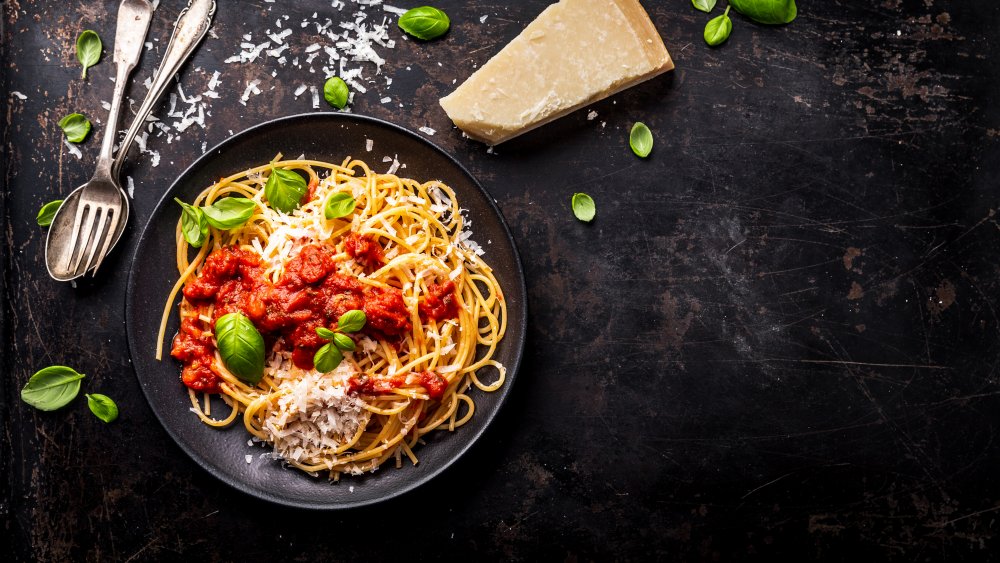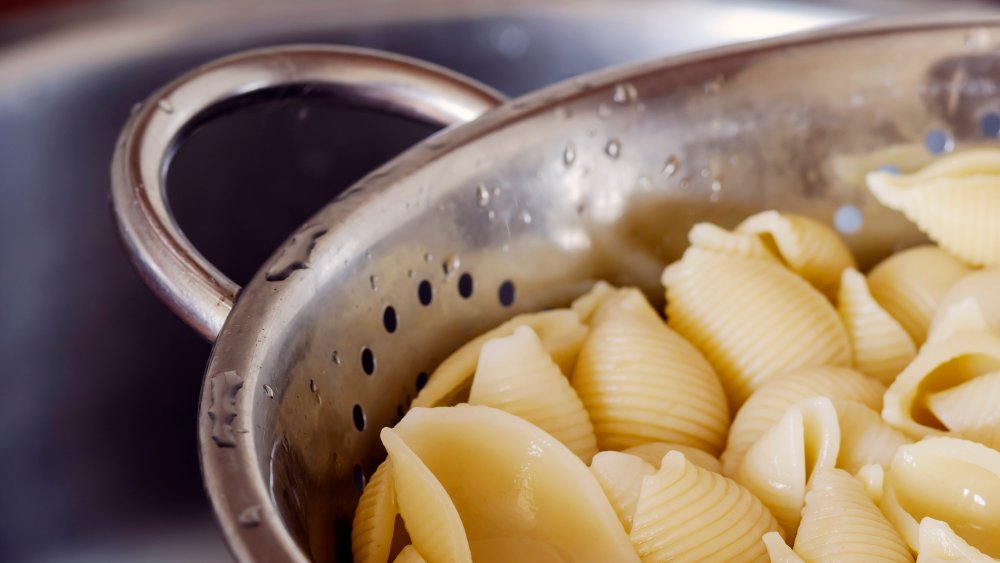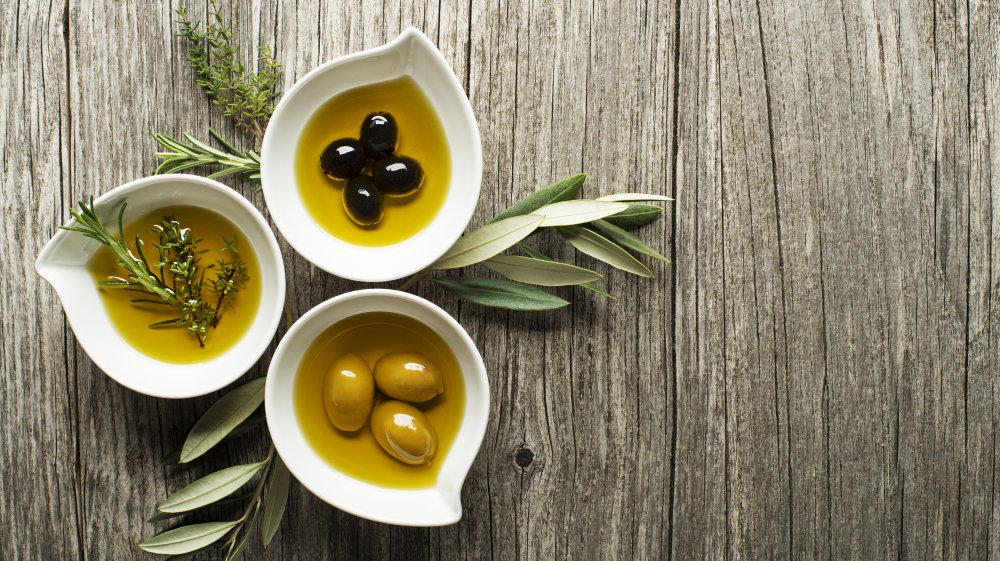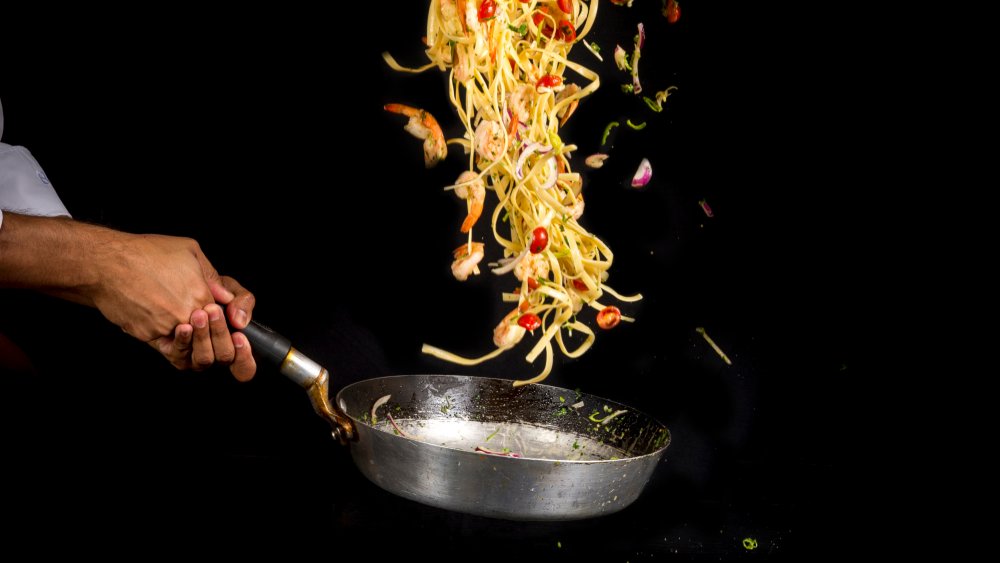Myths About Pasta You Can Stop Believing
It's one of the most universal foods, and yet, it's surrounded by so many misconceptions. Before pasta makes its way into your carbonara or bolognese, it has to be properly cooked. The wrong move can lead to soft, sticky, or flavorless pasta — and that can compromise your entire meal.
Some rules are crucial to remember: Salting your pasta water leads to a well-seasoned, flavorful dish (via Taste of Home). Stirring your pasta every so often will prevent your spaghetti strands from sticking together. Choosing the proper pasta shape and size will affect the outcome of your dish. Yes, pasta is often affordable and quick to make. But it's also a science and an art when you strive to cook it right. Who knew? Here are some commonly circulated pasta rules you shouldn't follow. They're fake and will not assist you in your pasta-cooking pursuits. Throw them in the garbage — just like the fettuccine you overcooked last week.
Rinsing the pasta with cold water? Don't do it.
Nobody wants overcooked, mushy pasta unless you're a literal infant or you have bad taste in food. And when you're cooking pasta, you're under pressure — understandably so — to remove it from its pot of boiling water at the perfect moment. So running the pasta under cold water sounds smart, right? Surely, it'll cool things down and stop the pasta from overcooking — right?
Turns out, rinsing your freshly cooked pasta with cold water does much more harm than good. When you dump cold water over the pasta, it washes away a layer of starch (via Smithsonian Mag). That starch is important to the overall dish: It allows your sauce to coat the pasta in a lovely, glossy way.
The only time you should be rinsing your pasta with cold water is when you're preparing to throw together a pasta salad, according to The Kitchn. In that case, you should also add some olive oil to prevent the cold pasta noodles from sticking together.
Adding oil to your pasta water? Useless.
Celebrity chef Lidia Bastianich says, "do not — I repeat, do not — add oil to your pasta cooking water! And that's an order!" If Lidia Bastianich has told you not to do it, then why are you still doing it?
Some cooks, who've been grievously led astray, have suggested adding olive oil to the boiling pasta water so that the pasta doesn't clump together (via Smithsonian Mag). But this so-called "hack" will actually sabotage your meal. Remember when we said that sauce should stick to the pasta? The oil will prevent this from happening. Who wants pasta sauce to slide, uninhibited, from your oily penne noodles, only to sink to the bottom of your plate? That's what we thought — no one.
If you're concerned about your pasta sticking together — totally valid — it's best to stir the pasta several times throughout the cooking process (via Spruce Eats). This will be far more effective, and you won't be wasting olive oil, which is basically liquid gold in our opinion.
Throwing pasta at the wall? Just plain wasteful.
Somewhere along the line, people started throwing pasta onto various surfaces — walls, ceilings, refrigerator doors. There's an ill-informed logic to this madness: If the pasta sticks, then it's perfectly cooked.
According to cookbook author Marcella Hazan, this isn't the case. In fact, if your pasta sticks, it might be a sign that it's overcooked (via Rachael Ray Mag). Anyway, your pasta should end up in your stomach, not on your wall. Really, the best way to cook any food is to taste it throughout the process. And Marcella Hazan thinks so, too: Simply bite into a piece of pasta to see whether you've achieved that tender-but-firm al dente consistency.
Why al dente? It doesn't just taste better: It's actually healthier. According to Smithsonian Mag, cooking your pasta al dente will lead to a lower glycemic index than you'd achieve with mushy, overcooked noodles. A lower glycemic index can allow you to stay full longer and can help with your cholesterol levels, according to Live Science. So can eating well-cooked pasta make you healthier? That's something we all want to believe.



